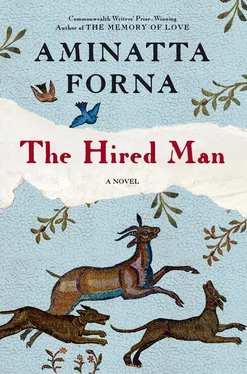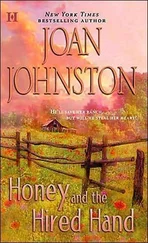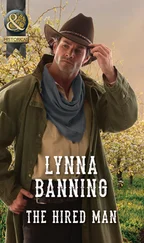After a week I went to see her parents, but they knew nothing, or would tell me nothing and did not invite me inside but stood together on one side of the stone wall that surrounded their house and their front garden planted with cabbages, shrugged and shook their heads, regarding me through black eyes, like a pair of trolls.
I waited for a whole winter for her to come back. The winter was a cold one. When it was over I went out to check the hives and found the bees were dead. I went for a long walk around the island. Once I stopped and looked up at the mountains on the mainland, the white rock and dark trees. I realised that for ten years there’d been a pebble in my shoe, and the word engraved on it was Gost.
‘She went back to her husband,’ I said to Laura. ‘Then I couldn’t believe it. Now I know this kind of thing happens all the time.’
‘She went back for the child,’ said Laura. She smiled sadly and that irritated me; I wished I’d never spoken. She poured more wine into her glass and mine. We were sitting at the kitchen table at the end of the day. My hands were white, chalky cement dust filled the creases; I’d just finished grouting the fountain mosaic. I had never told anybody except Anka about Pag, even now I’m not sure what made me tell Laura. I suppose because Laura asked me questions. She could be very persistent and anyway, Pag had been on my mind since our trip to Zadar. My mind had been running along all sorts of lines it hadn’t run on for years. Most of these memories I’d put safely away, as we all had, then something or someone comes along, like a plough through a fallow field in which all kinds of things lie buried under the crust of earth.
‘Maybe,’ I said. Laura wanted to spare my feelings, but she probably wanted to believe it, too. The truth is the woman I loved went back to the life that suited her better, as the wife of the deputy manager of a shoe factory, a man who also smelled of leather, but of a more expensive kind. I went once to the town where she lived and found her house. It wasn’t difficult. I followed her to work and then, in the afternoon, I followed her from her place of work to the school. She wore make-up and heels and a suit made of a synthetic fabric, she smoked as she walked along the street. The kid had a crew cut and a bit of a belly. When he jumped in a puddle she smacked him over the back of the head with the hand that held the cigarette. I wondered some years later what became of her, whether she survived or died, whether she was widowed. It never occurred to me to look for her.
Laura patted my hand, which lay on the table. Her fingers were cool and soft. Somewhere inside me, a nerve twitched.
In the space of nearly ten years everything and nothing has changed in Gost. My parents and sisters give a party to welcome me. My mother drinks bambus , lines like sun-rays spread from the corners of her eyes. My father has been occupied for several years building sheds so that the back yard has begun to resemble a small shanty town, as though a family of refugees have toiled across the continent and moved in. Talk of the sheds makes my mother puff and roll her eyes. The house is full so I sleep in one of them, wrapped in an old quilt with the smell of cut pine in my nostrils; it reminds me of the den I shared with Anka in the pine plantation. In the morning I draw water from the well to shave. At the party I am introduced to children I hadn’t even known existed, who blink, squirm and are pressed to kiss me. One boy refuses, breaks free of his mother and hides. In ten years I had been back perhaps two or three times, never staying for more than a night or leaving my parents’ house. My father had come to visit me several times, once when I first moved to Pag. He had loved the island almost as much as I did; he brought me a motor for my boat, understood why I was there.
The next morning, in the glare of our hangovers, Daniela and I walk to Gudura Uspomena. Anka is married, Daniela tells me, to Javor the son of my father’s boss at the post office. Javor runs a bar in town called the Zodijak, it’s very popular. Daniela and I are walking side by side, she puts her hand on my arm, stops and turns to face me, trying to find my gaze while I try to avoid hers. Later, I return to Gudura Uspomena without Daniela but with my old rifle, kept good by my father, who beams when he hands it over. It had belonged to him for three decades, before that to his father, who had been issued it on his first day as an infantryman in the war and had held onto it after he came down from months of fighting and hiding in the hills to be demobilised.
Just as they’ve been doing every evening of the last decade the deer drift out of the woods, camouflaged by the play of a pale green light. A long time since I’ve been out hunting. I wonder about my aim, whether to risk a head shot. I have no dog. The does are cautious as ever, holding their heads high and flicking their ears back as if they’ve already scented me. A young buck, maybe four seasons old, suddenly trots forward ahead of the herd. Old enough to know better, and so I fell him with a shot to the temple. My father claps me on the back and laughs until he has a coughing fit. He hangs the carcass in one of the sheds.
The next day I go looking for Anka. She’d moved into the blue house, left to her by her father. All over the country people lived together, generations in the same house. Life in the cities had become unbearable: apartments cross-hatched, divided and subdivided, with flimsy walls and curtains each time a baby came. Not so bad in the country, but even where there was space, building a house wasn’t easy: materials were expensive. So there was Anka, with a house of her own, a small house of her own. Perhaps old Pavić had decided to give his daughter a way out of her mother’s and brother’s reach. Who knows? Or maybe he just thought it was fair: after all Krešimir would one day inherit the town house. Pavić never counted on dying. On the other hand, he had the foresight to make a will. That said something about Pavić. He’d died when Anka was a child, so Vinka Pavić must have known for years that Anka would inherit the blue house and yet kept it from her daughter until Anka was more than twenty. That said something about Vinka. I wondered too how long Krešimir had known.
The knowledge must have simmered.
But when I round the corner whatever words I have in mind to say to Anka when we meet disappear. On the wall of the house a great bird rises, wings outspread, beak pointed to the sky. Glorious. Alive. A bird with blue wings, tipped with azure. A red-bodied bird, golden-plumed, dragging a golden tail. The bird’s head is turned to the left, as though it’s looking at me with a haughty stare. Its breath is exhaled in curls. Green hands outstretched below, trying to catch the bird or having just released it, who knows? I stand in the road and stare for a long time. I know nothing about these things, but I know Anka made it, this beautiful bird, because she is there in every detail of it, her joy. There is a fountain in the courtyard too, with brilliantly coloured fish swimming in the water. The house looks like something from a children’s story. It looks like no other house in Gost.
When she opens the door Anka is wearing a cotton dress and has her hair tied up in a scarf. I stand with my back to the fountain and to the sun. At first she doesn’t recognise me (though later she denies this). She blinks and pushes her hair back, finally says, ‘Duro? Duro! Duro! ’ more loudly each time, she throws her arms around me, presses the length of her body to mine and her nose into my neck. Her hair smells of vinegar. She kisses me hard and loud on each cheek.
Afterwards she steps back, puts her hands on her hips, cocks her head and looks at me, grins. She blows her fringe up from her forehead; to see her do so, the way I had seen her do so so many times, goes straight to my heart.
Читать дальше












